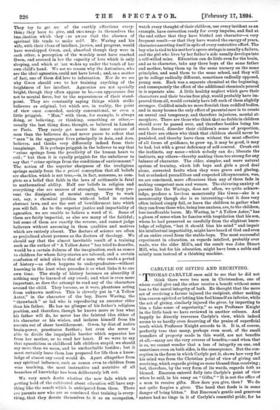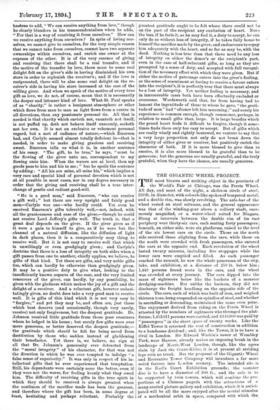CARLYLE ON GIVING AND RECEIVING.
" THOMAS CARLYLE once said to me that he did not think there were two men in Christendom, one of whom could give and the other receive a benefit without some loss to the moral integrity of both. He thought that the mere act of receiving a favour injured the recipient, either making him craven, spirited or letting him feel himself an inferior, while the act of giving, similarly injured the giver, by imparting to him a false sense of superiority," so says Professor Knight in the little book we have reviewed in another column. And happily he directly traverses Carlyle's view, which indeed seems to us hardly even deserving of the praise of superficial truth which Professor Knight accords to it. It is, of course, perfectly true that many, perhaps even most, of the small transfers of property made in this world, are not benefits at all,—many are the very reverse of benefits,—and when that is so, we cannot wonder that a loss of integrity on one, and sometimes even on both sides, is the consequence. But the con- ception in the form in which Carlyle put it, shows how very far his mind was from the Christian point of view of giving and receiving, which regards giving as more blessed than receiving ; but, therefore, by the very form of its words, regards both as blessed. Emerson entered fully into Carlyle's point of view when he said, in his essay on "Gifts," "It is not the office of a man to receive gifts. How dare you give, then P We do not quite forgive a giver. The hand that feeds is in some danger of being bitten." Bat Emerson's gentle and generous nature had no tinge in it of Carlyle's resentful pride, for he
liastens to add, "We can receive anything from love," though he clearly 'blunders in his transcendentalism when he adds, "For that is a way of receiving it from ourselves." How can we receive anything from ourselves ? In spite of loving our- selves, we cannot give to ourselves, for the very simple reason that we cannot take from ourselves, cannot have two separate ownerships within ourselves, and enrich one owner at the expense of the other. It is of the very essence of giving and receiving that there shall be a real transfer, and if the motive of the transfer be love, there must be some real delight felt on the giver's side in having diminished his own store in order to replenish the receiver's ; and if the love is reciprocated, there will be also some real delight on the re- ceiver's side in having his store increased at the cost of the willing giver. And when we speak of the motive of every true gift as love, we do not, of course, mean that it is necessarily the deeper and intenser kind of love. What St. Paul speaks of as "charity," is rather a benignant atmosphere or ether which flows from man to man as light flows from a centre in all directions, than any passionate personal tie. All that is needed is that charity which envieth not, vaunteth not itself, is not puffed up, doth not behave itself unseemly, seeketh not her own. It is not an exclusive or vehement personal regard, but a sort of radiance of nature,—which Emerson had, and Carlyle seemed almost totally deficient in—that is needed, in order to make giving gracious and receiving sweet. Emerson tells us what it is, in another sentence of his essay. "The gift, to be true," he says, "must be the flowing of the giver unto me, correspondent to my flowing unto him. When the waters are at level, then my goods pass to him and his to me ; " but he spoils the sentence by adding : "All his are mine, all mine his," which implies a very rare and special kind of personal devotion which is not at all possible in most cases, nor in any degree necessary in order that the giving and receiving shall be a true inter- change of gentle and radiant good-will.
"He is a good man," said Emerson, "who can receive -a gift well ; " but there are very upright and fairly good men—Carlyle was one—who hardly could. Yet even he received Emerson's gifts tolerably well,—not, indeed, with all the graciousness and ease of the giver,--though he could not receive Lord Jeffrey's gifts well. The truth is, that a -great deal depends on the giver. If the giver gives as if it were a gain to himself to give, as if he were but the -channel of a natural diffusion, like the diffusion of light in dark places, then it is a comparatively easy thing to receive well. But it is not easy to receive well that which is unwillingly or even grudgingly given ; and Carlyle's -doctrine that there is a loss of integrity on both sides when a -gift passes from one to another, chiefly applies, we believe, to -gifts of that kind. Yet there are gifts, and very noble gifts 'too, which can hardly be otherwise than grudgingly given. It may be a positive duty to give what, looking to the insufficiently known aspects of the case, and the very limited .resources of the giver, can hardly, by any possibility, be given with the gladness which makes the joy of a gift and the delight of a receiver. And a reluctant gift, however unhesi- tatingly given, no doubt does take a very good man to receive well. It is gifts of this kind which it is not very easy to "forgive;" and yet they may be, and often are, just those -which best deserve (and occasionally, though very rarely, -receive) not only forgiveness, but the deepest gratitude. Dr. Johnson received little gratitude from those poor creatures -whom be lodged in his house ; but surely few gifts were ever more generous, or better deserved the deepest gratitude,— the gratitude which should be felt for being saved from destitution by those who sadden instead of gladdening their benefactor. Yet there is, we believe, no sign at -all that Dr. Johnson's generosity ever detracted from the "moral integrity" of his character, for that was not the direction in which he was ever tempted to indulge "a false sense of superiority." It was only in respect of his in- tellectual gifts that he ever experienced that temptation. Still, his dependants were certainly none the better, even if they were not the worse, for feeling keenly what they owed him. The difficulty of receiving gifts in the true spirit in which they should be received is always greatest when the costliness of the sacrifice made has been the greatest, -and therefore where the gift has been, in some degree at feast, hesitating and perhaps reluctant. Probably the
greatest gratitude ought to be felt where there could not be on the part of the recipient any exaltation of heart. None the leas, if he feels it, as he may feel it, a duty to accept, he can only do so without loss of integrity, if he takes fully home to himself the sacrifice made by the giver, and endeavours to repay him adequately with the heart, and so far as may be, with the deed. Nothing is less true than that there need be any loss of integrity on either the donor's or the recipient's part, even in the case of half-reluctant gifts, so long as they are prompted by a sense of duty, and accepted with full recogni- tion of the necessary effort with which they were given. But if either the motive of patronage enters into the giver's feeling, or the sense of resentment at having to receive a favour enters into the recipient's, it is perfectly true that there must always be a loss of integrity. Yet neither feeling is necessary, and in innumerable cases both have been effectually excluded or overcome. Wordsworth said that, far from having had to lament the ingratitude of those to whom he gave, "the grati- tude of men" had " of tener left him mourning ;" and surely his experience is common enough, though commoner, perhaps, in relation to small gifts than large. It is large benefits which the proud heart finds it difficult to forgive, though it some- times finds them only too easy to accept. But of gifts which are really wisely and rightly bestowed, we venture to say that a very large proportion not only do not break down the integrity of either giver or receiver, but positively enrich the character of both. If it is more blessed to give than to receive, it is also more blessed to be grateful than to be generous ; but the generous are usually grateful, and the truly grateful, when they have the chance, are usually generous.







































 Previous page
Previous page